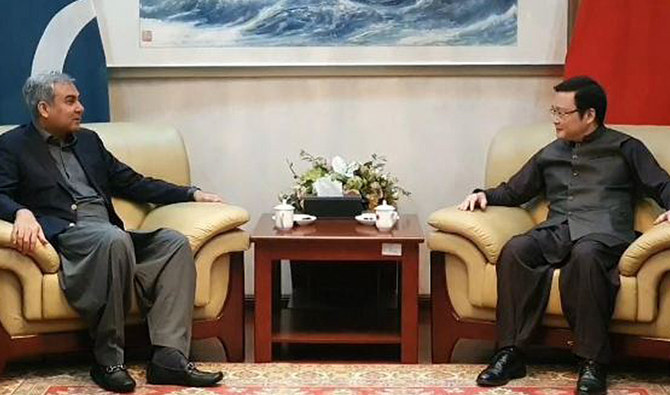ISLAMABAD: Clad in a crisp blue uniform and gripping the nozzle with practiced ease, Sumeera Bibi pumped fuel into the tank of a car, gesturing to the driver to check the reading on the dispenser machine.
While fuel stations in Pakistan have been traditionally staffed by men, there is a growing movement toward gender inclusivity, with some stations now employing women like Sumeera as attendants.
One notable example was the launch last year of Pakistan’s first all-female staffed fuel station, located in Johar Town, Lahore.
In the federal capital of Islamabad also, hundreds of women are now working alongside male staff at fuel stations.
“Since getting this job, I have been able to care for my children on my own and overcome all my problems,” Sumeera, a mother of five, told Arab News on Monday at a Pakistan State Oil station on Constitution Avenue, home to major government buildings and embassies.
Getting the job has been life changing for Sumeera, married for years to a drug addict, before the relationship spiraled out of control and she was forced to move in with her sister.
“There were many difficulties as I had no job and was dependent on my sister,” said Sumeera, who works an 8 am-6pm shift six days a week.
“We faced many problems in the beginning, especially when customers would often try to touch our hands while returning their [credit] cards,” she said.
But getting a timely salary, annual bonus, free medical care and the means to raise and educate her children without being dependent on anyone have made all the difficulties worth it.
“Before this, I had never worked. I had never even dealt with strangers,” she said. “Now, I deal with all kinds of people every day. There’s no shame in hard work.”
“POSITIVE RESPONSE“
The overall labor force participation rate for women in Pakistan at 25 percent is significantly lower than the global and South Asian average. A large portion of women in the labor force (67 percent) are employed in agriculture, with only 16 percent in services and 14 percent in manufacturing, according to UN Women. Even among women with higher education, labor force participation rates are relatively low, with only around 25 percent of women with a university degree participating in the labor force.
Several factors contribute to the lower female labor force participation, including social norms, safety concerns, lack of mobility, and the availability of transportation.
But despite the challenges, more and more women are venturing out.
Another fuel station attendant, Sana, who only gave her first name, said getting a job had taught her how to face the world and deal with all kinds of people, including those who did not appreciate women working in public spaces in a male-dominated filed.
“Every type of customer visits the station,” she told Arab News.
“Some customers praise our work, saying it’s great that we are working in an open environment instead of being confined to an office, while others discourage us, saying it’s not suitable for women.”
But management was supportive and helped to protect against and handle customers who caused trouble or misbehaved, Sana added.
Rukhsana Bibi, who works at a PSO station in Islamabad’s F-8 sector, said she felt “secure” at the job, as all stations were monitored by CCTV cameras.
Coming from a middle-class background with limited education, Rukhsana said she stepped out of her home not just to earn but to build a better future for her children.
“My husband is a laborer, and his income couldn’t cover our household expenses and children’s education, that’s why I left home.”
Jahanzaib Abbasi, Deputy Division Manager at PSO Islamabad, said the company, as an equal opportunity employer, had started hiring women during the coronavirus pandemic.
“We received a very positive response,” he said. “Many women have now been working for six months to two years, and they are satisfied and happy with their jobs.”
For customers like Azka Durrani, seeing women confidently working at fuel stations is a “heartening sign of growing empowerment and changing social norms.”
“Whenever I see these ladies working at a fuel station,” she said as Rukhsana filled her car’s tank, “I feel empowered.”
















